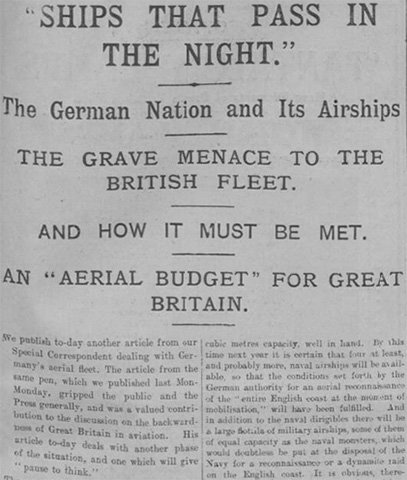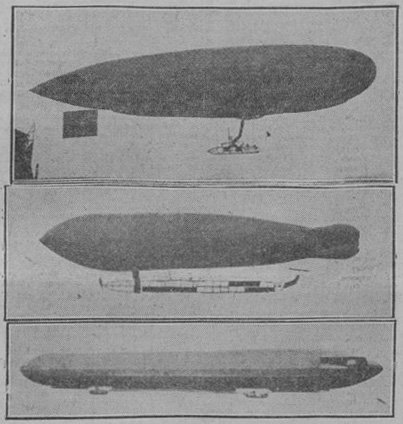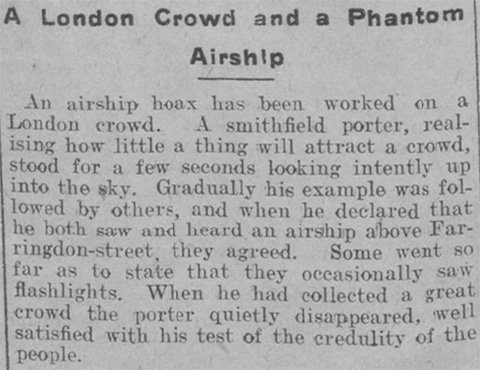
It's a new week, and (mercifully) the volume of phantom airship stories has dropped sharply. But not to zero. Mr H. Wooliley of 10a Rose Lane, Mossley Hill, Liverpool, has written in to the Liverpool Echo to report that (p. 7)
Last night (Sunday) [2 March 1913] at 7.45, looking over Eastham way, a very strong light, which was certainly not a star, could be seen in the sky. I pointed it out to two or three friends, and we all came to the conclusion that it was the aircraft seen in different places lately. It was visible for fully five minutes, the light varying in size from time to time. We could not make out any shape, but it was going at a great pace, and we lost sight of it over New Brighton way.
The Dundee Courier is likewise able to report a local airship sighting (p. 5):
Two men who are in the Corporation employ, were standing talking in Bell Street about nine o'clock [on 2 March 1913], when their attention was attracted by a bright light in the western sky. They both observed it at practically the same time.
At first it appeared dimly, gradually increasing in strength until it flashed into great brilliance, resembling a powerful acetylene-lamp. The light gradually receded into the darkness, but it burst forth again in all its brightness a minute later. The second time it as quickly disappeared.
When 'Asked if they could see any form of an airship, the men replied that the light was too bright, and was straight in their eyes'.
'Do you think it was near to the city?'
'Oh no; it was a good distance off,' remarked one of the men, 'but the light was one of the most powerful that I have ever seen.'
But there is no interest in these mystery airships outside of their place of origin.
Of course, that might change tomorrow -- yesterday's report from the City of Leeds is followed up today by several papers, including the Manchester Guardian which quotes Captain Lundie himself (p. 9):
'We had just left Grimsby for Hamburg on Saturday night, February 22,' he said, 'and when passing the Burcom buoys I saw an airship overhead some distance up heading west-south-west from the North Sea. It was coming over the narrow strip of land forming Spurn Point direct towards Grimsby. Second Officer Williams was on the bridge with me. He saw the ship at the same time and got it under observation with the bridge binoculars. The moon shone brightly for a time, and we saw the hull with perfect distinctness, with its wing attachments, for fully two minutes. There were no lights visible on the airship at any time, and there could be no suggestion that we were deceived or misled. The moonlight was beautifully clear, and only when the moon was obscured did we lose it from view. Arriving at Hamburg I reported the facts by mail to my superior, Captain Boothby, at Grimsby.
The Manchester Courier considers Lundie's statement to carry such weight that it headlines its story 'AIRSHIP MYSTERY SOLVED. COMPLETE CONFIRMATION OF THE VISIT' (p. 7). It's really not clear why it's any different to any of the previous reports, especially since the article also admits that there have been many cases of misperception:
a lot of foolish reports were circulated; people who have never seen airships and know nothing about them imagined they saw airships. A correspondent travelling to Urmston in a 'bus was informed that an airship was in the sky. He dismounted, and looking up at the Heavens saw -- a star. In some parts of the country wags have sent up fire balloons, so that reports of airships might be spread. As we happen to know the difference between airships, fire balloons, and stars, readers of 'The Manchester Courier' have not had nonsensical reports served up for their consumption.
But the Courier is not backing away from the scareships, not at all. It uses them to go on the offensive:
During the past week the British nation has been 'seeing airships' -- according to several Liberal newspapers.
and
Liberal newspapers which indulge in elephantine humour, and parody music-hall songs when dealing with a question of national gravity, are hoist with their own petard. For there is ample foundation for the statement that an airship did appear off Grimsby last week-end.
and
What Liberal newspapers regard as fiction, therefore, becomes well-authenticated fact.
The reason is made clear in the accompanying and much longer article (above) from the Courier's mysterious German correspondent, who has previously argued that the visitor to Sheerness was a German military Zeppelin and here demands that the Government spends, not the paltry £1 million suggested by the Observer and other newspapers, but twice that:
A grant of two million pounds, less than the cost of a single battleship, would probably suffice to give us an emergency force of airships and aeroplanes adequate to repel any invasion by air of which our prospective enemies are capable at the moment, and after that we shall need a large sum annually for the development of the aerial fleet. In a word, the time has come to establish an 'Aerial Budget' in place of the paltry doles which have hitherto been squeezed out of the Treasury. The success of the agitation for four additional Dreadnoughts in 1909 demonstrated the irresistible force of organised public opinion. A similar demonstration is needed to-day even more urgently than it was four years since, but this time the demand must be made in the interests of the air fleet. If the mysterious airships which come by night have helped to galvanise public opinion into organised activity, they will not have come in vain.
Simply put, the scareships are just too useful to discard. In this vein the following illustration, ostensibly a depiction of airships on order for the Royal Navy (a German Parseval and a French Astra-Torres) might be considered an invitation for readers to see more airships:

Our sketches will enable readers to distinguish between non-rigid and rigid types of airship. The new Parseval airship for the Navy will be similar to the top photograph; the Astra-Torres airship will be not unlike the second photograph. The lower photograph is that of a Zeppelin.
But the Liberal press is not going to take this sort of thing lying down. The Manchester Guardian has an odd piece of fiction, entitled 'Seeing an airship', about a journalist interviewing an airship witness and persuading him to change and eventually drop his story because the details differ from what others have described (p. 16). Presumably this is meant to show that the press reports themselves influence airship narratives, though in the story the airship is actually whittled down from a fully fledged Zeppelin with 'Von Moltke' and a black eagle on the stern to nothing at all, which would seem to conflict with the Guardian's sceptical position. The Dundee Courier offers a short spiel by a 'humorous countryman' who, unlike Uncle Tom Cobleigh, is too clever to mistake a star for an airship (p. 8). The Irish Independent (admittedly not Liberal but Unionist in the Irish sense, meaning it's complicated) notes 'the declarations of a Leeds trader that he has sold several of these [fire] balloons within the past few weeks, an unusual circumstance at this time of the year' (p. 5). Most interestingly, in the midst of a discussion about the need for more recruits for the Territorials, the military correspondent for the Derby Daily Telegraph breaks into a rant about what phantom airships could lead to (p. 2):
We have been having scares galore just recently, and now there are 'mystery' airships -- probably ordinary fire balloons sent up in a very spirit of mischief -- which are causing the 'jingoes' to bleat frantically again. 'The Germans are reconnoitring,' they say, and they go on to frighten various people with stories of invasion, blood-shed, rapine, and murder. 'There is no help for it,' they add -- at least those are old enough to be exempted -- 'we must have conscription. It is our only chance of salvation.' That is a position which few people would consider likely, but there are many unexpected things that happen in this world, especially when the 'Jingo' element comes on top. A general election, a strong Jingo campaign, and a few 'airship mysteries,' together with a few garbled and exaggerated reports of tension between France and Germany, and England will be in for it. Level-headed men will have no hearing from the mob, and nothing will be looked at save little Union Jacks. A strong Unionist majority would be returned, and a scheme of compulsory service would be frantically hurried through the House. One does not expect that the House of Lords would need the coercion of the Parliament Act, and England will be a second Germany herself. But in a very short time England would wake up and wish she had kept sober.
As strange as it may seem, in fact the National Defence Association did recently invoke the airship menace as an argument for compulsory military training for the nation's youth, in an open letter to the prime minister published widely in the press.
Finally, today the Globe has a new theory about the Sheerness incident. A Zeppelin is still involved, but it's less sinister than some of the other scenarios which have been contemplated (p. 7):
Mr C. G. Grey, editor of the 'Aeroplane,' and a prominent and well-informed writer on aeronautical subjects, has learned that an expedition was recently made to this country by a German Prince, who was accompanied by a number of friends. 'According to my information,' said Mr. Grey, 'the Prince of Pless, who is well-known in England from his marriage with Miss Cornwallis-West, hired the German airship Hansa from the private company which owns it, and left Germany with a few companions late one afternoon last October. His idea appears to have been to land in England and pay a surprise visit to a certain nobleman here. Owing, however, to a strong wind and the absence of any properly-conceived landing station, it was deemed impracticable to make a descent, and the vessel was accordingly turned around and piloted home. As the date of the visit is believed to coincide with the date of the report of the airship heard in flight over Sheerness, there seems little reason to doubt that the foregoing is the explanation of the mysterious visit. These details, I may say, have reached me from two independent sources, and I have every reason to believe that they are correct.'
Like the new theory for the Dover incident propounded yesterday, it seems strange this information should take so long to emerge, and it would also seem to contradict the recent denials from both the German Admiralty (which specifically mentioned Hansa) and from the Zeppelin Company. If the whole affair was triggered by something as innocent as an aerial jaunt by a bored aristocrat then why not say so before now? The Globe also asked Grey what he thought of the mystery airship reports, to which he replied that 'I see no reason to doubt that they spring from a basis of truth', which seems to represent a modification of his position, and suggests that the airship might in fact be using a 'ship moored at some point outside the ordinary steamship lines' to 'get reinforcement of gas and provisions'. Like the Manchester Courier, he is singularly impressed by Captain Lundie's sighting, as indeed is the Globe itself. Like the Manchester Courier, the Globe is not giving up on the phantom airships:
An increasing volume of evidence gives colour to the supposition that some at least of the reports of unknown airships over this country have some basis of fact. The allegation that such visits are impossible is disposed of by the official confirmation of the fact that a foreign airship flew over Sheerness last autumn, and to believe that crowds of people, including an absolutely independent ship's captain [...] have been deluded by a phantom demands too great a stretch of the imagination to be satisfactory. The balance of probability seems to lean towards a modified acceptance of the truth of the reports.
A courageous position.
![]() This work is licensed under a Creative Commons Attribution-NonCommercial-NoDerivatives 4.0 International License.
Permissions beyond the scope of this license may be available at http://airminded.org/copyright/.
This work is licensed under a Creative Commons Attribution-NonCommercial-NoDerivatives 4.0 International License.
Permissions beyond the scope of this license may be available at http://airminded.org/copyright/.





Erik Lund
So if there's not much scareship news today, what's your excuse for depriving us of more Uncle Tom Cobleigh, Brett?
Brett Holman
Post authorIn no particular order (or relevance):
1. This post was only about 2000 words long, so it's true it was a bit shorter than 5 of the 6 preceding posts.
2. I forgot to mention that the 'humorous countryman' this time was 'Birdofredum Sawin', so a Yankee; and that the source was originally The Field.
3. When Uncle Tom Cobleigh talks about scareships again I'll talk about Uncle Tom Cobleigh.
4. No, just... no.
Pingback:
Wednesday, 5 March 1913
Pingback:
Scareship Venus
Pingback:
Thursday, 6 March 1913 | Airminded